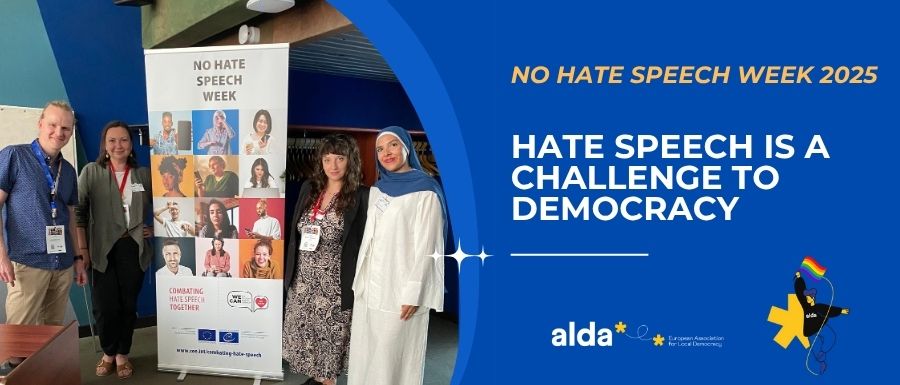From the 18th to the 20th of June, the No Hate Speech Week took place in Strasbourg. No Hate Speech Week is an event organised by the Council of Europe that gathers various participants from all fields and all of the 33 members of the Council of Europe, all engaged in preventing and combating hate speech. The 2025 edition was focused on “Enhancing legal and non-legal measures against hate speech through a multi-stakeholder approach”. During the event, conferences as well as workshops were organised for participants to exchange on good practices and innovations to fight hate speech, discuss recent legal and policy developments, etc.
“Hate speech is not an isolated issue, but a part of a deeper challenge – to trust, to truth, to democracy itself”
-Council of Europe Secretary General Alain Berset at the opening of the No Hate Speech Week 2025
No Hate Speech Week is organised to prevent and fight hate speech as a global threatening issue. Although there are a lot of definitions and interpretations around the term hate speech, in a general way, hate speech includes any kind of communication that uses pejorative or derogatory language with reference to a person or a group attacking who they are (ethnicity, religion, gender, etc.). Both online and offline, forms of hate speech can include stereotyping, stigmatization, etc. It is often employed in the promulgation of conspiracy theories, disinformation and denial and distortion of historical events, including genocide.
In times of technological progress and achievements such as the internet or AI, hate speech has become a global concern: its scale and impact have grown with new communication technologies and now has power to influence and spread hate to a wider scale, making it even more dangerous. Hate Speech not only causes harm at the personal level and can incite violence, it is an attack on inclusion, diversity and human rights. In this spirit, Alda is dedicated to fight and prevent hate speech.
At the occasion of No Hate Speech Week, the Gender, Inclusion and Human RIghts’Hub presented two projects: Stand-Up and Hatedemics, both aiming to fight against hate speech and hate crime. The first project presented was Stand-Up. In short, Stand-Up, whose full title is “enhancing cooperation through technology”, uses software and online data to link reporting, investigation, prevention, and victim support in a coordinated system that strengthens collaboration between agencies. The project took place from April 2022 to March 2024. Its objectives were to enhance multi-agency cooperation in countering hate crime by establishing harmonised definitions of hate crime and hate speech, standardise reporting procedures, deepen relevant actors’ understanding of the phenomena of hate speech and hate crime, and strengthen victim support. The project Pilot was implemented to test new tools to improve early detection and prevention of hate crimes, and as a conclusion to the project, a victim support handbook aiming to prevent hate speech crimes by promoting good practices and guidelines for CSOs and LEAs was published.
Similarly, the Hatedemics project aims to strengthen the measures against hate speech and disinformation online with the creation of a Platform using AI tools, will empower NGOs/CSOs, fact-checkers, public authorities, and youngsters as activists to effectively prevent and combat polarisation, the spread of racist, xenophobic and intolerant speech, as well as conspiracy theories. Through the development of the Hatedemics Platform, a toolsuite that brings together the partners’ expertise gained in hate and disinformation prevention and countering, the project will design and deploy interactive training and educational paths, informed by a commitment to EU values and rights as well as raise awareness and foster the active participation of EU-27 citizens. The first results, that are promising, were presented at the occasion of the project’s mid term conference that took place in Brussels in March 2025. Ending in March 2026, the project is currently in the last phases of its implementation.
Overall, No Hate Speech Week was an inspiring event that fostered the exchange of knowledge, the sharing of good practices, and the generation of new ideas.
